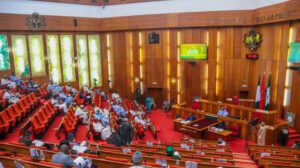


Niger condemns student’s offensive language in school debate
The Ministry for Basic and Secondary Education in Niger State has expressed its disapproval of a student’s use of offensive and aggressive language during a school debate.
The Ministry’s Information Officer, Malam Jibrin Kodo, released a statement condemning the incident, which was captured in a viral video on social media.
The statement was made available to the press in Minna on Sunday.
The statement said that “the disturbing content of the video was evident that the student was coached to use violence and vulgar language in his presentation.
“Such behavior is not only unacceptable by the Ministry, but also goes against the values, respect and decorum that should be upheld in an educational setting,” it said.
The ministry, however, emphasised the importance of promoting a positive and respectful learning environment for students and pupils at their formative age.
It noted that the use of vulgar and violent languages not only reflects poor orientation for the individual pupils, but also to the school and the educational system.
It further disclosed that the Commissioner of the Ministry, Hajiya Hadiza Mohammed, has vowed to investigate the incident.
It added that an appropriate disciplinary action would also be taken against those responsible for coaching the student to use such language.
The Ministry urged all schools to reinforce the importance of good conduct among students both in and outside the classroom.
It stressed the ministry’s commitment to upholding high standards of behaviour and academic excellence in schools.
It added that the ministry would not tolerate any form of ill behavior that undermines its principles.



